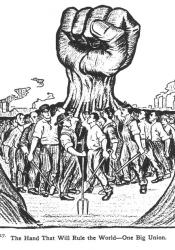Karl Marx and the Working Class
Karl Marx was born May 5, 1818, in Prussia to Jewish parents and studied history, law, and philosophy in Germany. Marx focused on philosophy for the majority of his education and received his PhD after completing his dissertation: “Different between the Philosophies of Nature of Democritus and Epicurus.” Specifically, his most known works were written in 1848 (The Communist Manifesto) and from 1867 to 1883 (Das Kaptial). Because of his influence, Marx is still revered as a prominent political and social figure and his namesake is synonymous with social theories (“Karl Marx”). Because of his political theories and prominence, Marx and his family were stateless and living in London with his wife and children; despite his stateless citizenship, Marx managed to collaborate with colleagues who belonged to the socialist school of thought (“Karl Marx”).
Marx’s residency in London influenced much of his intellectual life having lived in the city for 34 years until his death in 1883. Since Marx was living in London, he was able to examine capitalist society at its core. Because of his residency in London, Marx worked closely with Friedrich Engels, a German socialist. As a result of Napoleon III’s rise to power in France, Marx wrote The Eighteenth Brumaire of Louis Bonaparte and followed that work with other writings to the New York Daily Tribune directed at Americans as an insider’s look on Europe and European society and its political climate. Marx was also involved in the International Working Men’s Association and the Paris Commune in 1871. Many of the work Marx wrote in this time period were critiques of the political climate and labor movements (“The International Working Men’s Association”).
Much of what Marx writes about during his life and his time in England focuses on “human emancipation” even though there isn’t a specific definition of what that is. Many theorize that the human emancipation Marx focuses on is applicable to most aspects of his theories; instead of a capitalist society, Marx is a proponent of community and labor that is fulfilling and unionized’ Marx's working-class consciousness can be described as such: “What this view overlooks is the possibility that real freedom is to be found positively in our relations with other people. It is to be found in human community, not in isolation” (“Marx and Working-Class Consciousness”). These critical theories heavily rely on the politics of society and economics, creating a subset of political theory specifically deemed as Marxism in which societies are a result of class conflict and inequality. In Marxism, this class conflict specifically lies with the bourgeoisie—those in control of the means of production—and the proletariat—those who belong to the working class (“Marx and Working-Class Consciousness”). This system predicts self-destruction and a forthcoming of a socialist means of production that relies on class consciousness and the “proletariat revolution.” This revolution in turn, Marx argued, would free the working class and unite everyone under a socio-economic emancipation (“Marx and Working-Class Consciousness”).
Marx’s theories have affected the way we view class systems and how it applies to society as a whole. The proletariat revolution is bigger than the Great Resignation even though it aligns with much of the sentiments behind the movement. Not only does Marxism connect with the Great Resignation—its influence is heavily prominent in the “Conflict in Ukraine: A History” timeline as well. Many political activists today see the resolution of the Great Resignation as an opportunity to introduce Marx’s concepts, as well as involving the American people in a social revolution that rejects capitalism and embraces more leftist forms of government and regulation.
Related Links:
Capital in the Twenty-First Century
The Fall of the USSR and Ukrainian Independence
Works Cited
Levin, Michael. “MARX AND WORKING-CLASS CONSCIOUSNESS.” History of Political Thought, vol. 1, no. 3, 1980, pp. 499–515, http://www.jstor.org/stable/26211821. Accessed 1 May 2022.
Morris-Keitel, Peter. "Karl Marx (5 May 1818-14 March 1883)." Nineteenth-Century German Writers, 1841-1900, edited by Siegfried Mews and James N. Hardin, vol. 129, Gale, 1993, pp. 229-240. Dictionary of Literary Biography Vol. 129. Gale Literature: Dictionary of Literary Biography, link-gale-com.proxy.ulib.uits.iu.edu/apps/doc/LWYBSO782985871/DLBC?u=iulib_iupui&sid=bookmark-DLBC&xid=8aaa3aab. Accessed 30 Apr. 2022.
"The International Working Men's Association." Times, 27 Oct. 1871, p. 4. The Times Digital Archive, link-gale-com.proxy.ulib.uits.iu.edu/apps/doc/CS67284315/TTDA?u=iulib_iupui&sid=bookmark-TTDA&xid=7f2e6098. Accessed 30 Apr. 2022.

